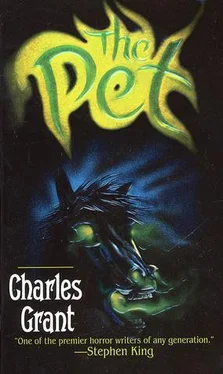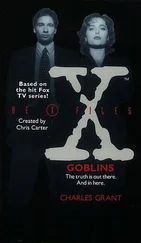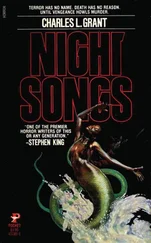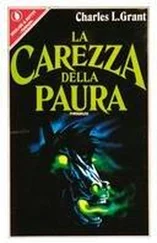He almost forgot Thursday’s biology test.
“The meeting’s over by now,” Joyce said.
Harry Falcone punched at the pillows behind his back and watched with a lopsided grin as she dressed. “Tell him it ran late.”
“They always run late. He doesn’t believe it, you know.”
Falcone shrugged; he didn’t care.
When she was finished, she turned to look at him, the sheet just barely over his groin, his dark curly hair in matted tangles over his face. Patrician , she thought; put a toga on him and he’d look like a Roman senator about to slice up an emperor.
His smile exposed capped white teeth. “Thinking about seconds?”
She was. She hated herself for it, but she was. She wanted those hands on her rough not gentle, she wanted the weight of him crushing her into the mattress, she wanted the forgetfulness his sex brought — and she wanted to cut his throat for what he was making her do to her family.
“No.”
“Too bad,” he said. “Once the strike starts, it’ll be hard seeing you.”
Gathering her hair so she could tie on the ribbon, Joyce walked out of the room and picked up her coat. A hesitation— did she leave anything behind Norman would notice? — before she opened the apartment door.
“Hey,” he called from the bedroom.
She waited.
“Nice lay, kiddo.”
Bastard , she thought, slamming the door behind her, wincing as she headed for the fire exit and took the stairs shakily.
It was stupid, and it was the stuff of dreamlike romance— that a man would come along and sweep her off her feet, carry her into the sunset and unheard of ecstasy. She had told herself a thousand times that it was partly Norman’s fault, that his preoccupation with running the school and unofficially running for mayor had somehow left her behind. She was no longer his partner, but a woman expected to remain ten paces back in his shadow.
The catch was, she’d never been able to keep a secret from her husband. Her eyes, too large for deception, betrayed her every night, and she was positive he was taunting her, tormenting her so she would admit it to his face.
And as she drove home, making sure she approached the house from the direction of the building where the meeting was supposed to have been held, she put a hand to her breast and felt the residue of Harry’s touch.
It would be a hell of a lot easier , she thought, if she could just decide if staying with Norman was mere habit, or real love. And if it was the latter, what would Harry do if she broke the affair off?
The temperature slipped just before dawn, and the ground was covered with crackling frost, the first of the season. It ghosted the windshields and sugared the lawns, and as he walked to school he watched his breath puff to clouds. It was a good feeling, and he took long strides to force himself awake. He hadn’t been sleeping long the night before, when something inside reminded him about the exam. He had awakened instantly and sat at his desk until just before sunrise, alternately reading his notes and talking with the galloping horse who had no pity for his error. When his mother came home from the committee meeting, he had gone rigid, expecting a scolding for being up so late, and was surprised when she passed the door without stopping, sounding for all the world as if she were crying.
At the end of the block he turned left, having studiously avoiding staring at Chris’s house. He crossed the street and moved more briskly, keeping his eyes wide, hoping a good strong wind would slap some sense into his foggy brain.
On his left were small houses crowded together on small lots, smothered by trees and azaleas and evergreen shrubs. Two blocks later they were stopped by a high chain link fence almost buried under swarms of ivy that rolled over its top. A large manicured lawn began on the other side, sweeping back and down the slope toward practice fields and the stadium, sweeping ahead of him toward the bulk of the school itself — a building of red brick and greying white marble, two stories in front and three in back, where the land fell away; tall windows, wide tiled corridors, an auditorium that seated over eight hundred, built in the 1930s and never replaced.
Ashford North, on the far side of town, had been constructed in 1959, was brick and white marble, one story with tinted windows, and it looked like a factory.
From the sidewalk Don climbed three steps to a wide concrete plaza that led to a dozen more low steps and the glass front doors. Paths were worn brown over the grass to the side entrances, and there were faces in the classroom windows watching the students hurrying, dawdling, daring the first bell to ring before they stepped inside.
He didn’t wait, though a few called his name; he pushed straight in and swerved left to the banks of multicolored lockers at the end of the hall. A fumbling with the combination lock, and he grabbed the books he needed for his first three classes. A few rushing by greeted him with yells, but he only waved without turning; he was tired, and he didn’t want to talk to anyone until, if he were lucky, he finally woke up.
He didn’t.
He almost fell asleep in trig, actually dozed for a couple of minutes in English, and in German sat with his fingers pulling on either side of his eyes to keep them from closing. None of the teachers noticed. None of his classmates did either.
Just before ten-thirty he passed the glass-walled front office and saw his father standing at the chest-high reception counter with Mr. Falcone. They were speaking softly, heatedly from the way his father slapped a newspaper against his thigh and the way he swiped the side of his hawk’s nose as if he were a boxer; and as he moved on with a worried frown, the biology teacher stormed out of the glass-walled room and nearly collided with him. There was no apology; the man marched on, and Don’s throat went dry. The voice of the corridor buzzed until he had a headache, and he stumbled back to his locker, took out his biology notebook and text, and floated into study hall, where he tried to concentrate on the lessons.
His mother didn’t care about his father anymore.
He flipped open the book and toyed with the transparencies that displayed in garish color the inner workings of a frog.
His father didn’t care about his mother. Once, last night while the room was dark and they had started arguing again after Joyce had returned, he thought he heard Mr. Falcone’s name.
The quick breakfast he had made for himself suddenly curdled and threatened to climb into his throat, making him swallow four times before he knew he wouldn’t throw up. Without realizing it, then, he moaned his relief, and only a muffled giggling behind him gave warning that Mr. Hedley was coming down the aisle.
“Mr. Boyd?”
He looked up into a pair of horn-rimmed glasses. “Yes?”
“Are you having a little do-it-yourself choir practice back here, Mr. Boyd?”
The giggling again, and outright laughter from Tar and Fleet on the other side of the large room.
His face grew warm. “No, sir.”
“Then may I suggest you remain a bit more silent so that the rest of us can get on with our work?”
“Yes sir, I’m sorry.”
“Thank you, Mr. Boyd.” Hedley turned, Don’s stomach churned again, and he inadvertently managed to make his acidic belch sound like another groan. Hedley reversed himself slowly. A small man, nearly as wide as he was tall, with a dark plastered fringe of red hair and a thick twitching mustache. “Mr. Boyd, perhaps you didn’t hear me.”
He felt perspiration gathering coldly under his arms. They were all watching him now, waiting for him to brave it out the way Tar would, or Brian. But he could only blink and gesture helplessly at his abdomen, pantomiming an upset stomach because the acid was climbing again and he felt his cheeks begin to burn.
Читать дальше












